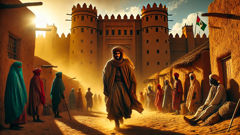Introduction
Across the golden plains of northern Nigeria, where the Sahel meets the savannah and sun-baked winds carry the scent of acacia, a legend has shaped the very identity of a people. In every market square and under the shade of ancient baobab trees, elders tell the story of Bayajidda—a stranger from distant Baghdad whose destiny was forever intertwined with the birth of the Hausa states. His tale is woven into the fabric of Hausa heritage, not merely as myth but as the living spirit behind kingship, courage, and unity. It is a story of exile and belonging, of monsters and queens, of a lone traveler whose journey would forge dynasties and redraw the map of West Africa. From the walled city of Daura, with its legendary well and the coils of a serpent, to the seven Hausa kingdoms whose descendants still speak his name, Bayajidda’s saga is more than a hero’s quest—it is a chronicle of transformation. Within these lines, the clash of sword against scale and the quiet exchange of water at dawn become symbols of hope and the triumph of will over fear. The path Bayajidda walked, marked by the crunch of red sand beneath his sandals and the prayers whispered beneath distant stars, invites us to witness not just the slaying of a beast but the birth of a civilization. This is the legend of Bayajidda: the founder, the liberator, the father of a people.
A Stranger’s Journey: From Baghdad to Hausaland
The story of Bayajidda begins not in Africa, but in the ancient city of Baghdad—a city of minarets and marketplaces, where the Tigris glimmered beneath moonlight and the air shimmered with tales of adventure. Born to nobility, Ahmad ibn Abdallah, later called Bayajidda, was raised in the shadow of palaces and the echo of prophecy. Yet fate, ever restless, would not let him linger in comfort. A dispute at court—some say political intrigue, others whisper a forbidden love—forced the young prince to flee. Alone, he journeyed westward, guided by dreams and the silent pull of destiny.

His path wound through deserts where only the hardiest acacia dared grow, across the Nile, and into the arid lands that sprawled beyond the great Sahara. For months, Bayajidda pressed on. His feet grew raw, his supplies dwindled, but a vision—of a city with seven gates and a queen who wore the crescent moon—haunted his sleep. The closer he drew to Hausaland, the more vivid these dreams became. Merchants he met on dusty caravan trails spoke in awed tones of Daura, a walled city ruled by the wise Queen Daurama and haunted by a serpent that strangled the city’s only well.
Bayajidda’s arrival in Hausaland was marked by silence and suspicion. He reached Garun Gabas, a settlement on the borderlands, where he was offered little more than a gourd of water and cautious stares. The people were wary of strangers; their trust was hard-earned. Bayajidda, drawing on his upbringing, spoke softly and listened more. He learned their tongue, observed their customs, and watched as life revolved around the struggle for water—every drop precious, every day shaped by the fearsome snake Sarki.
Word of the stranger’s humility and strength began to spread. He aided the old in lifting their burdens, taught children simple games from Baghdad, and shared stories by firelight. Though haunted by exile, Bayajidda found purpose in these acts of kindness. Yet his heart remained restless. Each night, he gazed toward Daura, where the city’s well—called Kusugu—waited behind heavy stone and the shadow of the serpent. In his dreams, the queen’s face grew clearer, her eyes filled with both sorrow and hope.
At last, hearing of a festival in Daura, Bayajidda set out for the city’s gates. He arrived beneath the midday sun, his clothes faded but his bearing noble. The city’s walls rose tall and ancient, carved with symbols of old kings. Within, he saw women queuing for water, each holding empty calabashes and glancing anxiously at the well’s enclosure. A hush fell as he approached. The guards—tall, robed in indigo—asked his business, and Bayajidda replied only that he sought rest and water. Admitted to the guesthouse, he waited as dusk painted the sky in streaks of orange and indigo, watching and listening for his moment to act.
The Serpent of Daura: A Test of Courage and Destiny
Evening in Daura descended with languid heat. The city’s heart pulsed around Kusugu Well—a stone-ringed hollow at the edge of the central square, fenced with timber and watched day and night. In the twilight glow, Bayajidda listened as women told stories of Sarki the serpent: a monstrous beast coiled within the well, its scales as dark as midnight and eyes that glimmered green in the gloom. The serpent claimed dominion over Daura’s water, emerging only once each week to permit a single vessel to be filled. The city’s life was bound to its cruel rhythm. It was said that any who defied Sarki’s schedule faced swift and terrible retribution.

Bayajidda could sense the people’s exhaustion and resignation. Even the laughter of children in the dust was tinged with fatigue. One old woman, draped in a faded wrapper, recounted how her own son had vanished after trying to draw water on an unsanctioned day. The snake, she whispered, was no ordinary creature but a curse—some claimed it was sent by spirits, others believed it guarded an ancient secret.
One morning, as the air shimmered with the promise of another relentless day, Queen Daurama herself came to the well. She was tall and regal, her robes of indigo and gold trailing behind her. Her face bore the marks of wisdom and worry. She watched as her attendants carefully measured out water for the palace and gave gentle words to mothers with children at their side. Bayajidda, observing from the shade, felt his heart stir at her presence and sensed that his fate was now entwined with hers.
He resolved to confront the serpent. That night, after the city had settled and torches flickered low, Bayajidda crept to the well. The moon cast silver light on the stones as he removed his sandals and laid his only weapon—a gleaming sword from Baghdad—across his knees. He whispered prayers for courage, remembering his ancestors and the gods of his new land.
As midnight approached, a chill settled over the city. From the depths of Kusugu came a rustling, then a hiss that trembled through the earth. Sarki emerged—a mass of glistening coils, scales reflecting moonlight, eyes burning emerald. Bayajidda’s breath caught, but he did not move. The serpent’s tongue flickered, testing the air. With a shout that echoed into the night, Bayajidda leapt forward, sword flashing. The battle was fierce—steel against scale, strength against ancient malice. The serpent struck, its jaws snapping inches from Bayajidda’s face. He rolled, dodged, then drove his blade deep into Sarki’s side. With a final, shuddering cry, the beast thrashed and fell still, its coils loosening around the well.
The city awoke to shouts and the sound of water running free. By dawn, word had spread: the stranger had killed the serpent. Women filled their calabashes in tears of relief, and elders gathered to see the beast’s monstrous form stretched lifeless beside the well. Queen Daurama summoned Bayajidda to her court, her eyes alight with gratitude and newfound hope.
Queen Daurama and the Birth of the Hausa States
The aftermath of the serpent’s death rippled through Daura like rain on parched earth. With Sarki gone, the people rushed to Kusugu Well, their songs of gratitude rising with the morning breeze. For the first time in generations, water flowed freely—a simple act transformed into a miracle. Queen Daurama, ever wise, saw that Daura’s destiny had shifted overnight. She summoned Bayajidda to the palace, a sprawling compound adorned with carvings of lions and shields, where she received him in a hall perfumed by frankincense and acacia.

Bayajidda stood before the queen, humble yet unbowed. Daurama spoke with measured strength. “You have freed my people from fear. Name your reward.” The hero hesitated only a moment. “I wish for nothing but to remain in your land and serve your people.” His sincerity impressed Daurama, yet she knew tradition must be honored. In accordance with custom, she offered him her hand in marriage—a union that would bind stranger and city, past and future.
The wedding was a celebration unseen in Daura for years. Drums thundered across the city walls, dancers twirled in robes of crimson and blue, and the scent of spiced rice filled the air. Bayajidda, now prince-consort, pledged himself to Daura’s prosperity. The couple’s happiness was soon blessed by the birth of a son, Bawo—a child whose name meant “He Who Was Asked,” marking the question at the heart of their union.
In time, Bawo would become the forebear of a line of rulers who spread across Hausaland. The legend tells how Bayajidda’s sons—some born of Queen Daurama, others by women in other towns—became founders of the seven original Hausa states: Daura, Kano, Katsina, Zazzau (Zaria), Gobir, Rano, and Biram. Each kingdom was said to inherit a spark of Bayajidda’s courage and Daurama’s wisdom, their palaces echoing with stories of that fateful night by Kusugu Well.
Bayajidda himself remained a figure of both awe and humility. He visited each new kingdom, offering counsel and encouraging unity among the states. Under his influence, trade flourished along trans-Saharan routes, scholars gathered in vibrant markets, and the Hausa language became a bridge across vast lands. Elders invoked his name in prayers for rain and justice; children learned songs of his journey and triumph. The well at Daura was never again guarded by monsters—only by memories, kept alive through generations.
Conclusion
So ends the legend of Bayajidda—the exiled prince whose courage shaped a continent’s destiny. His journey from Baghdad’s gilded halls to Daura’s sun-baked earth was not merely a crossing of lands, but a passage between worlds: from foreigner to founder, from wanderer to father of kings. In freeing Daura from the serpent’s grip, Bayajidda proved that heroism is born not of birthright alone but of selfless action and faith in renewal. The union with Queen Daurama created more than a dynasty; it wove a new identity for Hausaland, one that would endure through centuries of change. Today, the Hausa people still gather at the Kusugu Well, telling stories beneath the same ancient trees. The tale of Bayajidda is no relic—it is a living reminder that every land is shaped by those brave enough to challenge fear and embrace belonging. The echo of his footsteps still stirs the dust along caravan trails, a testament to how legend can become legacy.













